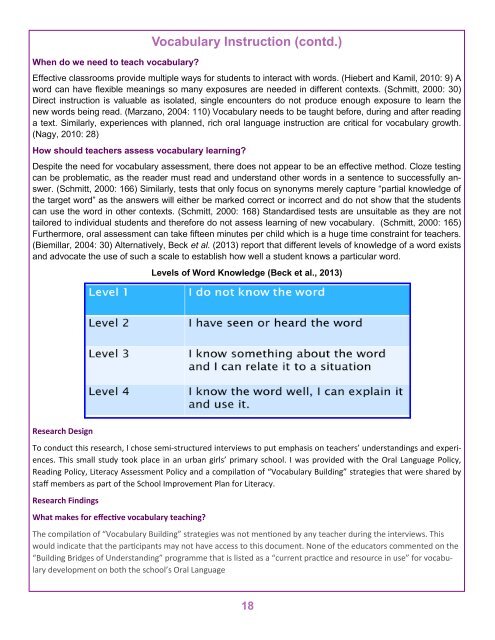LITERACY NEWS
LAI Newsletter 20_05_2015
LAI Newsletter 20_05_2015
- No tags were found...
Create successful ePaper yourself
Turn your PDF publications into a flip-book with our unique Google optimized e-Paper software.
When do we need to teach vocabulary?Vocabulary Instruction (contd.)Effective classrooms provide multiple ways for students to interact with words. (Hiebert and Kamil, 2010: 9) Aword can have flexible meanings so many exposures are needed in different contexts. (Schmitt, 2000: 30)Direct instruction is valuable as isolated, single encounters do not produce enough exposure to learn thenew words being read. (Marzano, 2004: 110) Vocabulary needs to be taught before, during and after readinga text. Similarly, experiences with planned, rich oral language instruction are critical for vocabulary growth.(Nagy, 2010: 28)How should teachers assess vocabulary learning?Despite the need for vocabulary assessment, there does not appear to be an effective method. Cloze testingcan be problematic, as the reader must read and understand other words in a sentence to successfully answer.(Schmitt, 2000: 166) Similarly, tests that only focus on synonyms merely capture “partial knowledge ofthe target word” as the answers will either be marked correct or incorrect and do not show that the studentscan use the word in other contexts. (Schmitt, 2000: 168) Standardised tests are unsuitable as they are nottailored to individual students and therefore do not assess learning of new vocabulary. (Schmitt, 2000: 165)Furthermore, oral assessment can take fifteen minutes per child which is a huge time constraint for teachers.(Biemillar, 2004: 30) Alternatively, Beck et al. (2013) report that different levels of knowledge of a word existsand advocate the use of such a scale to establish how well a student knows a particular word.Levels of Word Knowledge (Beck et al., 2013)Research DesignTo conduct this research, I chose semi-structured interviews to put emphasis on teachers’ understandings and experiences.This small study took place in an urban girls’ primary school. I was provided with the Oral Language Policy,Reading Policy, Literacy Assessment Policy and a compilation of “Vocabulary Building” strategies that were shared bystaff members as part of the School Improvement Plan for Literacy.Research FindingsWhat makes for effective vocabulary teaching?The compilation of “Vocabulary Building” strategies was not mentioned by any teacher during the interviews. Thiswould indicate that the participants may not have access to this document. None of the educators commented on the“Building Bridges of Understanding” programme that is listed as a “current practice and resource in use” for vocabularydevelopment on both the school’s Oral Language18


